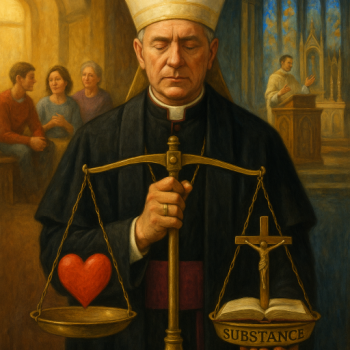
In my last article, I addressed the progressive Catholic penchant for sentimentality. I showed that Catholicism, in the hands of progressives, exchanges substance for sentiment, truth for feeling, and affirmation for holiness. In this article, I move on to my next contention: that progressive Catholicism elevates conscience and appeals to probabilism (sometimes explicitly, sometimes implicitly) to justify dissent and allow each progressive to act as their own magisterium. I offer three popular progressive Catholic organizations as examples: Catholics for Choice, New Ways Ministry, and the Women’s Ordination Conference.
- These groups consistently:
- Detach conscience from proper formation.
- Declare settled doctrine as unsettled.
- Present clear moral truths as “still developing.”
- Shift ecclesial authority to the individual.
What is Probabilism?
Catholics for Choice defines probabilism as:
recognizing that in some complex moral questions, there is more than one reasonable stance, and says that one’s conscience is free to hold any probable opinion, that is, one that is supported by knowledgeable parties or strong arguments.
Catholics for Choice (CFC)
Yes, this group promotes abortion rights, Communion for the divorced and remarried, same-sex marriage, and women’s ordination—all of which contradict Catholic doctrine and canon law. How do they justify this? By appealing to conscience and probabilism.
CFC affirms:
- “Magisterial teaching can never displace the role of conscience.”
- Catholics must “listen to both sides with love.”
- The Church must reexamine “gaps in magisterial teaching on abortion.”
- “Probabilism recognizes that some complex moral questions inspire more than one reasonable stance.”
- Catholics must honor “the reciprocity of conscience,” meaning “open and respectful dialogue.”
CFC not only insists that conscience trumps hierarchy, but it also openly invokes probabilism to justify dissent. As they explain:
One’s conscience is free to hold any probable opinion … Probabilism shines when there is legitimate pluralism…
This strategy mirrors the progressive model: dissent is not just allowed—it becomes theologically sanctioned when credible disagreement exists, even when the Church has definitively spoken.
New Ways Ministry (NWM)
New Ways Ministry describes itself as:
…a Catholic outreach that educates and advocates for equity, inclusion, and justice for LGBTQ+ persons, equipping leaders to build bridges of dialogue within the Church and civil society.
Like CFC, NWM elevates conscience as the ultimate authority—but with more nuance.
They begin in line with Church teaching:
The Magisterium teaches that conscience is the inviolable ‘most secret core’ of the human person where God speaks to them.
This echoes Gaudium et Spes:
In the depths of his conscience, man detects a law which he does not impose upon himself, but which holds him to obedience…
NWM continues:
A person is bound to properly form one’s conscience through the Word of God…
This also reflects the Catechism (CCC 1785), which states that the Word of God guides conscience formation.
They add:
…to make practical and concrete judgments according to one’s conscience, and to abide by those judgments…
Again, this aligns with CCC 1780–1781, which teaches that we must always obey the certain judgment of a properly formed conscience.
But then comes the pivot:
…in an acknowledgement that conscience, as God’s voice, is the ultimate authority.
Here, NWM breaks with Catholic doctrine. Conscience is not infallible, nor is it the ultimate authority. Truth, revealed and entrusted to the Church, holds that role.
NWM commits not to Church teaching but to what St. John Paul II warned against in Veritatis Splendor:
There is a tendency to grant to the individual conscience the prerogative of independently determining the criteria of good and evil… This individualism leads to a denial of the very idea of human nature.
NWM also appeals to probabilism in its statement on gender identity:
Magisterial teaching on transgender identities and transitioning is emerging, but there is not yet a comprehensive doctrine.” (emphasis added)
This mirrors the pattern: present a settled issue as unsettled to justify dissent under the guise of moral development.
Women’s Ordination Conference (WOC)
The Women’s Ordination Conference does not frequently appeal to conscience or probabilism in its official materials, but it follows the same underlying logic. WOC cites theologians and historians who challenge the Church’s teaching on the male-only priesthood, questions the finality of Ordinatio Sacerdotalis, and asserts that Catholics may rightly adopt the dissenting view.
This reflects probabilism in substance if not in name: when “credible” disagreement exists, they claim, Catholics may adopt the more permissive view—even when it contradicts magisterial teaching.
That said, WOC does appeal to conscience and probabilism in its “Mythbusters: Women’s Ordination Edition” video series:
Myth 5: “Supporting women’s ordination means you’re against the Pope and the Church.”
Appeals to conscience:
Myth 2: “The Church has never ordained women.”
Invokes probabilism via disputed historical and theological evidence:
Final Thoughts: Conscience Without the Church Becomes a New Magisterium
The Church does not teach that conscience is infallible. As Veritatis Splendor paragraph 63 reminds us:
Conscience is not an infallible judge; it can make mistakes.
And paragraph 64 adds:
Christians have a great help for the formation of conscience in the Church and her Magisterium… For the Catholic Church is by the will of Christ the teacher of truth.
This is the definitive Catholic teaching on conscience. That some moral issues (such as abortion, gender identity, and women’s ordination) have vocal dissenters does not mean Catholics are free to “hold any probable opinion.” Let’s call this what it is: dissent disguised as conscience, weaponized to allow progressives to act as their own magisterium.
We must reject this spiritually bankrupt “theology” and remain faithful to the truth handed down and upheld by the Catholic Church.












